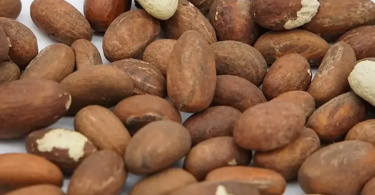5 interesting health benefits of Agbalumo (African star apple)
The African star apple is commonly known as agbalumo in Yoruba and Udara in Igbo. It is also called African cherry. It is delicious and low in calories. It is a power-packed favourite.
At a glance, the African cherry appears rather small and insignificant in comparison with many other fruits. Yet, experts on nutrition have repeatedly affirmed its uncommon nutritional benefits as well as its efficacy in the prevention and management of diabetes and heart diseases………CONTINUE READING
I particularly chose to discuss this fruit because of its high Vitamin C content. Vitamin C, also known as ascorbic acid and ascorbate, is a vitamin found in various foods and sold as a dietary supplement. It is used to prevent and treat scurvy.
Vitamin C is an essential nutrient involved in the repair of tissue and the enzymatic production of certain neurotransmitters. It is required for the functioning of several enzymes and is important for immune system function. It also functions as an antioxidant. However, as important as Vitamin C is, humans, unlike other animals, cannot make it!
Humans are one of the few mammals unable to manufacture ascorbic acid in their liver. The only way humans can make up for this inborn Vitamin C deficiency is to include foods rich in Vitamin C in their diet.
I made consultations on the use of the seed in herbal medicine. According to Mr Akintunde Oluseyi, a herbal practitioner in Ile-Oluji, Ondo State, the seed of agbalumo is a potent cure of hernia, especially when diagnosed early. He reeled out steps on how to prepare the seed for the treatment of hernia.
On the nutritional contents of C. albidum for human consumption, Prof Ignatius Onimawo of the Department of Biochemistry, Ambrose Alli University, Ekpoma, Edo State, said the fruit serves as a good source of calcium, with each providing an individual with 10 per cent of the daily requirement.
He asserted that calcium lends strength to human bones and teeth, and may also lessen symptoms of premenstrual syndrome, such as cramping and abdominal bloating. The fruit also contains five per cent of the daily recommended value per serving of Vitamin C and Vitamin A.
He added that one serving of cherry serves up to two per cent of iron, a mineral vital for oxygenating the body.
Speaking on other health benefits of the African cherry, the expert noted that cherries may have particular benefits for diabetics. Citing a research published in the September 2009 edition of the African Journal of Pharmacy and Pharmacology, the result indicated that the leaves of the fruit reduced glucose levels in diabetic rabbits, the same function that insulin in the human body performs.
He referred to a study by researchers at the Department of Biological sciences, College of Science and Technology, Covenant University, Ota, Ogun State. The study showed that the local cherry fruit lowered blood sugar and cholesterol and could be useful in preventing and treating heart diseases.
A reference was also made to a research conducted at the Forestry Research Institute, Ibadan, Oyo State, on the antibacterial activity of the African cherry leaves against common bacterial isolates.
Last season, I ate the fruit like never before because I got a supply from a particular seller who sells sweet ones. I noticed that each time I ate it, I belched a million times thereby getting a relief from my constipation. I can confidently say that with African star apple, I don’t need any drugs for constipation!
Some of the health benefits of the African star apple are itemised below:
It is a great source of calcium. This fruit can give you up to 10 per cent of your required daily calcium intake. This calcium will help build and maintain strong bones and teeth.
It is used in herbal medicine. It is often used to treat malaria and yellow fever. The cotyledons on the young seedlings are helpful in treating vaginal infections. This treatment is commonly done in the western part of Nigeria.
It has a high Vitamin C content. This helps in curing colds and preventing scurvy. Per 100g of this fruit, you can get 25g of Vitamin C.
It can be used for healing and treatment of wounds such as cuts, sprains etc., especially the leaves, roots and barks as they have healing components.
It helps with weight loss. The fruit is high in fiber which reduces your appetite and prevents you from eating too much. For people who count their calories, it might be the fruit you have been waiting for. Studies have shown that a serving of agbalumo contains 67 calories, thus making it a good option for people with weight issues as they get fewer calories intake in the process of consuming it.
The fruit helps in lowering cholesterol and blood sugar, thus reducing your chances of getting heart-related diseases.
It eases digestion, thus preventing bloating and constipation.
The acidic taste of the fruit is helpful during pregnancy. It prevents the urge to vomit.
This fruit is a natural antioxidant. Antioxidants remove potentially damaging oxidizing agents in a living body. Vitamin C is an antioxidant thus making udara high in natural antioxidant.
Antioxidants help prevent the damage to the system caused by free radicals. Free radicals are unstable molecules produced in your cells during your own metabolism. Their production increases in response to stress or injury. Intake of foods and drinks that can neutralise these free radicals are highly encouraged, and agbalumo does just that.
In some parts of Nigeria, the seed is used to treat skin infection.
It is used well in folk medicine. The sweet and sour taste of agbalumo acts as a natural remedy for common issues such as constipation, toothache, sore throat and indigestion.
Herbal practitioners are also known to use the bark of the tree to treat yellow fever and malaria, while the leaves are useful for treating wounds, stomach ache and diarrhoea. However, the leaves have been proven to be toxic when taken in excess quantities.
The roots are used in the treatment of sexual weaknesses, asthma and sterility.
The bark are used in the treatment of cough and yellow fever.
The cotyledons on the young seedlings are also helpful in treating vaginal infections.
The season is here again – do not miss out on the numerous benefits this fruit has to offer.











